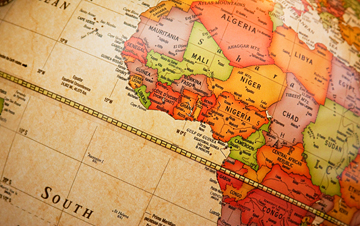You are here
Conference Celebrates Public Health Success and Needs in Africa
In the past decade, significant steps have been taken to improve public health outcomes in Africa, including progress in combatting and preventing HIV, malaria, polio and measles. These successes should rightfully be celebrated, but there is still work to do in Africa to ensure better health for the people living there, which in turn will strengthen African economies as well as bolster defenses against contagious disease outbreaks.
 At a conference in Atlanta yesterday, titled Health in Africa: The Unfinished Agenda, policymakers, government officials, academics, philanthropies and business leaders came together to discuss how health improvements can be advanced in the nations of Africa going forward.
At a conference in Atlanta yesterday, titled Health in Africa: The Unfinished Agenda, policymakers, government officials, academics, philanthropies and business leaders came together to discuss how health improvements can be advanced in the nations of Africa going forward.
Centers for Disease Control and Prevention (CDC) Director Tom Frieden, MD, MPH, said that “While much progress has been made, it is fragile.” For instance, Frieden highlighted tremendous advancements in addressing infectious diseases in Africa, but he followed with some of the challenges to carrying out public health there—namely, fragile infrastructures for public health, conflict zones and pessimism. He also described other serious public health issues facing the nations of Africa, including non-communicable diseases, such as heart attacks and cancer, and injuries like auto crashes and violence against women and girls.
And Frieden stressed the need to work with African countries to improve global health security—that is working with African countries to find, stop and prevent health threats before they spread. He described how many in Africa saw CDC as a “911 for the world.” To truly improve global protection, however, he said that countries must be able to conduct their own disease detection, response and prevention work and that the CDC was working with countries in Africa to improve these capabilities.
U.S. Senator Johnny Isakson (R-GA) emphasized the importance of CDC’s global health security work when he said “a virus anywhere is a threat to everyone everywhere.” While recounting his visits to Africa while serving on the Senate Foreign Relations Subcommittee on African Affairs, Isakson said “America needs to be a leader in security and a leader in health. Only nine-tenths of 1 percent of U.S. spending goes toward foreign aid. These efforts represent the soft power of the United States. Our sharing of knowledge is one of the things that makes us great.”
Yesterday’s conference represents the third in a series examining health issues in Africa hosted by the World Affairs Council of Atlanta, the Center for Strategic and International Studies and CARE. The CDC Foundation was pleased to serve as a sponsor for the conference, which is an extension of the Foundation’s efforts to establish public-private partnerships on CDC’s behalf. Our partnerships support CDC’s vital public health work in the United States and around the globe, including numerous projects in Africa.
